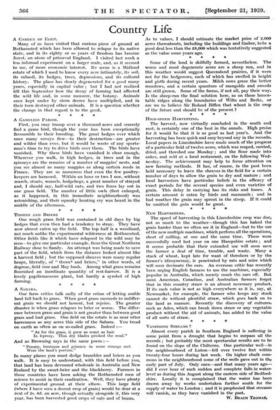A SAHARA.
Our farm critics talk sadly of the crime of letting arable land fall back to grass. When good grass succeeds to indiffer- ent grain we should not lament, but rejoice. The greater disaster is when grass relapses to brier or worse. The differ- ence between grass and grain is not greater than between good grass and bad grass. One field on the estate is as near utter barrenness as any acres this side of the Sahara. You tread on earth as often as on so-called grass. Indeed :-
" Aa for the grass, it grew as scant as hair
In leprosy. Thin dry blades pricked the mud." And as Browning says in the same poem :--
" Penury, inertness and grimace in some strange sort Were the land's portion."
In many places you must dodge brambles and briers as you walk. It is easy to understand, with this field before you, that land has been devoured wholesale in Australia and New Zealand by the sweet-brier and the blackberry. Farmers in those countries have been asking the Rothamsted men of science to assist in their eradication. Well, they have plenty of experimental ground at their elbow. This large field (where I have seen a decent crop of grain) would be dear at a rent of 2s. 6d. an acre, though actually alongside it, this very year, has been harvested good crops of oats and of beans, As to values, I should estimate the market price of 2,000 acres thereabouts, including the buildings and timber, to be a good deal less than the £8,000 which was tentatively suggested. as the value some years ago.












































 Previous page
Previous page